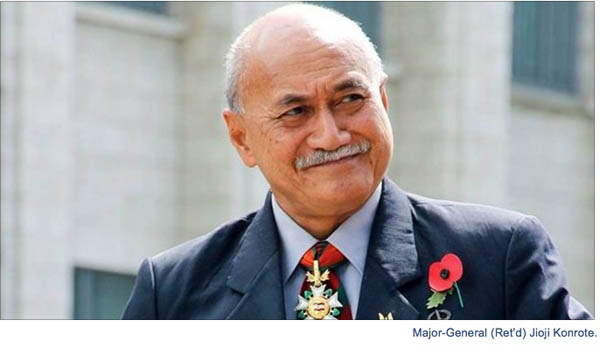From Fiji Sun (23 June 2020)
Konrote, Heart Of A Soldier
The interview with President, Major-General (Retired) Jioji Konusi Konrote was made possible through the request of the Third Infantry Regiment in line with the Infantry Day Celebrations today.
By Rosi Doviverata
 |
|---|
Immediately after completing his Senior Cambridge at Natabua High School in Lautoka, a young and daring Jioji Konusi Konrote wanted to try something different.
It was 1966. The Vietnam War had been raging for over ten years.
Young men around the world probably felt the same motivation – become a soldier and make the world a better place.
Despite his parent's insistence to try medicine or engineering, the young Konrote only had one thing on his mind – become a soldier.
His mother Mue Sakamu Konrote found out about his military expedition. She quickly made her way to Suva from Rotuma and demanded that her son returns to school.
It did not work. Her son had his mind set.
At the time, the Republic of Fiji Military Forces was largely an infantry regiment. The young Konrote mastered life at the barrack. Toilet cleaning was mandatory. So was keeping well above the required fitness level or RFL.
Those infant years as a soldier taught him lessons that prepared him for the many leadership roles he was later bestowed.
Infantry officers simply trained to survive in any operational exercise.
After Fiji's Independence in 1970, he was seconded to the New Zealand Armed Forces and served in the elite New Zealand SAS. Later he was seconded to the British Army Far East Land Forces.
He served as a Platoon Commander (Reconnaissance Platoon) with the 1st Battalion, The Royal Hampshire Regiment and a Staff Officer in Headquarters 51 Infantry Brigade in Hong Kong.
The exposure and experience in both the British Army and in New Zealand changed his perception as a junior officer.
The experience was invaluable.
He rose through the ranks of the RFMF to become a Major-General. But early on, he stamped his mark as a friendly but firm leader.
He was the only Fijian to hold the position of a United Nations Assistant Secretary-General and concurrent Force Commander of the United Nations Interim Forces in Lebanon (UNIFIL 1997-1999).
These were probably the highlight of his decorated career under the blue helmet.
But by this time, he was well versed with the challenges encountered on the ground. Its dangers and politics.
He observed that peacemaking and peacekeeping were two totally different concepts.
In 1982 he was awarded the Military Cross for Gallantry on Active Service.
Among the UN policymakers, he was not popular.
"Kofi Annan and I did not see eye to eye on issues, but that's life."
Mr Annan was the UN Secretary-General from 1997 to 2006.
Major-General (Retired) Konrote fought hard to have all UN peacekeepers (particularly those countries not in the first world category) to be remunerated equally.
During his time, remuneration increased from $11.23c per day to $23 per day.
Letters from home did not arrive after one or two months.
Today our soldiers earn $130 a day.
They can talk to their families every day – from the comfort of their bunks with free wi-fi.
"My advice to these young soldiers when they return from a tour of duty, buy a house.
"Your family is not going to live in a car."
Another milestone achievement was the compensation for Fijian soldiers who died in combat.
The US$50,000 compensation made possible only for peacekeepers who were killed in action after 1997.
As soldiers gather today to celebrate Infantry Day, Major-General (Retired) Konrote is hopeful that those here at home and those serving abroad work to maintain the legacy of being a 'good soldier.'
"You're here to do a job, do it to the best of your ability."
For Major-General (Retired) Konrote, his term as President ends next year.
"I've done my bit for God, King, and country.
"It's time to go fishing."





